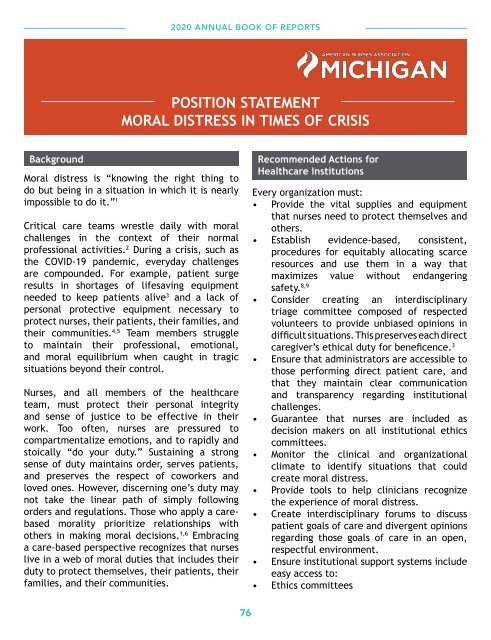ANA-Michigan - 2020 Annual Book of Reports
Create successful ePaper yourself
Turn your PDF publications into a flip-book with our unique Google optimized e-Paper software.
<strong>2020</strong> ANNUAL BOOK OF REPORTS<br />
POSITION STATEMENT<br />
MORAL DISTRESS IN TIMES OF CRISIS<br />
Background<br />
Moral distress is “knowing the right thing to<br />
do but being in a situation in which it is nearly<br />
impossible to do it.” 1<br />
Critical care teams wrestle daily with moral<br />
challenges in the context <strong>of</strong> their normal<br />
pr<strong>of</strong>essional activities. 2 During a crisis, such as<br />
the COVID-19 pandemic, everyday challenges<br />
are compounded. For example, patient surge<br />
results in shortages <strong>of</strong> lifesaving equipment<br />
needed to keep patients alive 3 and a lack <strong>of</strong><br />
personal protective equipment necessary to<br />
protect nurses, their patients, their families, and<br />
their communities. 4,5 Team members struggle<br />
to maintain their pr<strong>of</strong>essional, emotional,<br />
and moral equilibrium when caught in tragic<br />
situations beyond their control.<br />
Nurses, and all members <strong>of</strong> the healthcare<br />
team, must protect their personal integrity<br />
and sense <strong>of</strong> justice to be effective in their<br />
work. Too <strong>of</strong>ten, nurses are pressured to<br />
compartmentalize emotions, and to rapidly and<br />
stoically “do your duty.” Sustaining a strong<br />
sense <strong>of</strong> duty maintains order, serves patients,<br />
and preserves the respect <strong>of</strong> coworkers and<br />
loved ones. However, discerning one’s duty may<br />
not take the linear path <strong>of</strong> simply following<br />
orders and regulations. Those who apply a carebased<br />
morality prioritize relationships with<br />
others in making moral decisions. 1,6 Embracing<br />
a care-based perspective recognizes that nurses<br />
live in a web <strong>of</strong> moral duties that includes their<br />
duty to protect themselves, their patients, their<br />
families, and their communities.<br />
Recommended Actions for<br />
Healthcare Institutions<br />
Every organization must:<br />
• Provide the vital supplies and equipment<br />
that nurses need to protect themselves and<br />
others.<br />
• Establish evidence-based, consistent,<br />
procedures for equitably allocating scarce<br />
resources and use them in a way that<br />
maximizes value without endangering<br />
safety. 8,9<br />
• Consider creating an interdisciplinary<br />
triage committee composed <strong>of</strong> respected<br />
volunteers to provide unbiased opinions in<br />
difficult situations. This preserves each direct<br />
caregiver’s ethical duty for beneficence. 3<br />
• Ensure that administrators are accessible to<br />
those performing direct patient care, and<br />
that they maintain clear communication<br />
and transparency regarding institutional<br />
challenges.<br />
• Guarantee that nurses are included as<br />
decision makers on all institutional ethics<br />
committees.<br />
• Monitor the clinical and organizational<br />
climate to identify situations that could<br />
create moral distress.<br />
• Provide tools to help clinicians recognize<br />
the experience <strong>of</strong> moral distress.<br />
• Create interdisciplinary forums to discuss<br />
patient goals <strong>of</strong> care and divergent opinions<br />
regarding those goals <strong>of</strong> care in an open,<br />
respectful environment.<br />
• Ensure institutional support systems include<br />
easy access to:<br />
• Ethics committees<br />
76

















